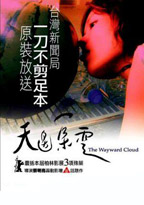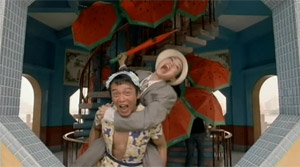

Tianbian yi duo yun
Taiwan 2005
Genre:
Drama
Director:
Tsai Ming-liang
Cast:
Chen Shiang-chyi
Lee Kang-sheng
Lu Yi-ching
Yang Kuei-mei
Sumomo Yozakura
Hsiao Huan-wen
Jao Kuo-xuan
Lin Hui-xun

The Wayward Cloud
Story: Taipeh is suffering from a dry period of alarming proportions. Citizens are stocking up on melons sold on every corner as they
have become cheaper than water. Shiang-chyi (Chen Shiang-chyi) has bought water and melons for the next few days, too. She also hasn't really much else to do
at the moment. But one day she comes across Hsiao-Kang (Lee Kang-sheng) in a park. The two seem to have been close in the past. They meet again and
again and spend more and more time together. However, Shiang-chyi doesn't know that Hsiao-Kang is shooting porn movies in the same building she is living
in. While he tries to avoid walking into her as good as possible she wonders why he behaves so reserved when their relationship starts to become more
serious. Neither of the two knows how to deal with the situation, but it seems unavoidable that Shiang-chyi ultimately finds out about Hsiao-Kang's profession.
The only question is under what circumstances...
Review: "The Wayward Cloud" is an arthouse flick but at the same time it hasn't been treated that leniently by every critic since it is
quite a controversial film. That is probably because the movie contains unsimulated sex scenes. Even though you actually don't get to see that much explicit
material after all, the film's last scene doesn't leave any doubt about the sex scenes being real. Such aspects coming from a mainstream movie may arouse
some feeling of discomfort, but in the end it doesn't tell you anything about the quality level of this piece of cinema. "The Wayward Cloud" is actually a
drama about isloation, alienation in the big city and the search for love. Thanks to some interesting motives all of this might work out quite well, but the
quietness and tranquility as well as aloofness, despite several sex scene, make this movie an affair that is hard to find access to.

The ever-apparant dry period, which accompanies the protagonists over the whole duration of the movie, naturally stands as an aspect of the aforementioned
symbolism. Water is a valuable good that makes an appearance in different shapes and is an object of desire. Taipeh is parched to such a degree that even
sanitary installations don't work anymore. Consequently, a porn scene under a shower has to be shot by using improvised tools and washing yourself becomes
almost a life's work. Director Tsai Ming-liang managed pretty well to convey this drought. The feeling that something is missing also reaches the viewer,
although what's really missing isn't water after all. Instead it is the closeness and love that the protagonists are searching for.

That's where things get a bit difficult. In some way a relationship develops between Hsiao-Kang and Shiang-chyi. The movie is in fact an indirect sequel to
"What Time Is It There?" as the question whether Hsiao-Kang still sells watches is proof of. However, the relationship is cut off by a wall. This literal
wall stands in stark contrast to the physical closeness during the final scene. The ending might be shocking with this contrast and the explicit scene
featured, but what direction all of this is meant to be headed remains a mystery. Is there really a message after all? But let's get back to the emotional
distance in the movie. This distance is mainly caused by cold interior shots and the fact that the characters are almost never talking. This works in movies
by Kim Ki-duk ("Pieta", "3-Iron"), but with Tsai the additional value is questionable.
The drama becomes even the more alienating because of the fact that the camera is mostly focusing on the protagonists without a single cut and most of the time
we don't get to see anything more than Hsiao-Kang or Shiang-chyi living their boring everyday life. Maybe boring isn't the right word when it comes to
Hsiao-Kang since he works as a porn actor, but still, his scenes look rather unspectacular in their own way - which was intended. After all, it's nothing more
than a job for him. Nevertheless, the sex scenes are some kind of diversion in "The Wayward Cloud". However, a more well-achieved counterweight to the cold
and loneliness-inducing scenes are some musical insertions. They are full of ideas and more than anything else are pretty joyful. What purpose they serve
in the drama is difficult to say, though, but most likely they depict the dreams and wishes of the protagonists.

Also quite decent are a few humoristic scenes which mostly work out because of the dead-pan expression of the individuals. Somewhere below the surface of the apparent motives there might even be a political level to be considered, an argument that is also supported by the movie's title. Taiwan is after all a pawn of much bigger powers in the world which have an interest in the country. That's all fine and well, but "The Wayward Cloud" still remains too confusing and lengthy. That the picture's incoherent tone turns out to be not that much of a problem is something director Tsai deserves some pat on the back for, but in the end the result is still a movie that wants to be more than it actually is. Or maybe there really is a multilayered piece of cinema behind the drama - but for this to make any impression the flick is too cold and rough around the edges.

Disclaimer

















